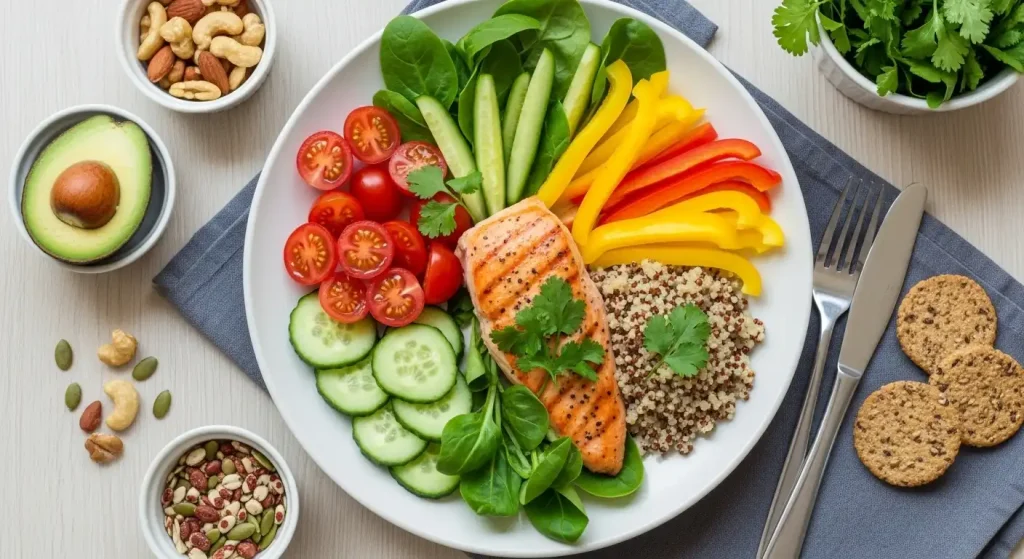Healthy eating has evolved dramatically in 2025, with consumers becoming more engaged with the positive role of nutrition for health, seeking out different healthier eating approaches. This comprehensive guide explores evidence-based nutrition strategies, practical meal planning techniques, and sustainable healthy eating habits that transform your wellbeing from the inside out.
Mindfulness & Mental Health: The Complete Guide to Inner Peace
Understanding Healthy Eating: The Foundation of Good Nutrition
Healthy eating isn’t about strict dietary restrictions or depriving yourself of foods you love. Instead, it’s about feeling great, having more energy, improving your health, and boosting your mood. Good nutrition provides your body with essential nutrients needed for optimal function while reducing the risk of chronic diseases.
The core principles of healthy eating include:
- Balanced macronutrients – Proper ratios of carbohydrates, proteins, and healthy fats
- Nutrient density – Choosing foods packed with vitamins, minerals, and antioxidants
- Portion control – Eating appropriate amounts to maintain healthy weight
- Whole food focus – Prioritizing minimally processed, natural ingredients
- Hydration balance – Adequate water intake for cellular function
Research shows that making most of your meal vegetables and fruits – ½ of your plate creates an optimal foundation for nutritious meals that support long-term health goals.
Ultimate Guide to Home Workout Routines: Build Strength at Home
Essential Components of a Balanced Diet
Creating nutritious meals requires understanding the five food groups and how they work together to provide comprehensive nutrition for your body’s complex needs.
Fruits and Vegetables: Nature’s Multivitamins
Fruits and vegetables should comprise half of every meal, providing essential vitamins, minerals, fiber, and phytonutrients that protect against disease. Aim for color and variety, and remember that potatoes don’t count as vegetables on the Healthy Eating Plate because of their negative impact on blood sugar.
Best choices for optimal nutrition:
- Dark leafy greens – Spinach, kale, arugula for iron and folate
- Colorful berries – Blueberries, strawberries for antioxidants
- Cruciferous vegetables – Broccoli, Brussels sprouts for cancer protection
- Citrus fruits – Oranges, grapefruits for vitamin C and fiber
Whole Grains: Sustained Energy Sources
Go for whole grains – ¼ of your plate to provide sustained energy and important B vitamins. Whole grains contain all parts of the grain kernel, offering more nutrition than refined alternatives.
Nutritious whole grain options:
- Quinoa – Complete protein with all essential amino acids
- Brown rice – High in manganese and selenium
- Oats – Beta-glucan fiber for heart health
- Whole wheat – B vitamins and dietary fiber
Top 10 Superfoods for Your Daily Diet Boost Health
Lean Proteins: Building Blocks of Health
Protein supports muscle maintenance, immune function, and satiety. To get enough protein throughout the day and maintain muscle, try adding varied protein sources to each meal.
High-quality protein sources include:
- Fish and seafood – Omega-3 fatty acids for brain health
- Poultry – Lean, versatile protein option
- Legumes – Plant-based protein with fiber
- Eggs – Complete protein with choline
- Nuts and seeds – Healthy fats plus protein
Strategic Meal Planning for Healthy Eating Success
Effective meal planning is the cornerstone of consistent healthy eating habits. Meal planning can help you make nutritious meals, save time, and spend less on food over time, making wellness both achievable and sustainable.
Weekly Meal Planning Process
Step 1: Assess Your Schedule Review your weekly calendar to identify busy days, social events, and time constraints that affect meal preparation.
Step 2: Plan Balanced Meals Plan your meals so you eat from all five food groups – fruits, vegetables, grains, protein foods, and dairy or fortified soy products – every day.
Step 3: Create Shopping Lists Organize ingredients by grocery store sections to streamline shopping and reduce impulse purchases.
Step 4: Prep in Advance Dedicate time for washing produce, cooking grains, and preparing proteins to simplify weekday cooking.
Sample Weekly Healthy Eating Menu
| Day | Breakfast | Lunch | Dinner | Snack |
|---|---|---|---|---|
| Monday | Overnight oats with berries | Quinoa vegetable salad | Grilled salmon with broccoli | Greek yogurt with nuts |
| Tuesday | Veggie omelet with toast | Lentil soup with whole grain roll | Chicken stir-fry with brown rice | Apple with almond butter |
| Wednesday | Smoothie bowl with spinach | Turkey and avocado wrap | Black bean tacos with salsa | Hummus with carrots |
| Thursday | Greek yogurt parfait | Leftover lentil soup | Baked cod with sweet potato | Mixed nuts and dried fruit |
5 Easy Healthy Breakfast Ideas for Busy Mornings
Current Nutrition Trends Shaping Healthy Eating in 2025
Understanding current nutrition trends helps you make informed choices about incorporating new approaches into your healthy eating routine.
Gut Microbiome-Focused Nutrition
As science advances and interest in holistic health grows, I predict that, in 2025, eating for a healthy gut microbiome will be a key nutrition trend. This approach emphasizes foods that support beneficial bacteria in your digestive system.
Gut-healthy foods include:
- Fermented foods – Yogurt, kefir, kimchi, sauerkraut
- Prebiotic fibers – Garlic, onions, asparagus, bananas
- Diverse plant foods – Various fruits, vegetables, and whole grains
- Omega-3 rich foods – Fatty fish, walnuts, flaxseeds
High-Protein Focused Eating
Protein-rich nutrition has gained significant attention for weight management, muscle preservation, and satiety. We’ll likely see more emphasis on reducing salt and sugar, incorporating pre- and probiotics, offering high-protein options, and featuring clean labels.
Clean Label Movement
Consumers increasingly seek transparency in food ingredients, driving demand for minimally processed foods with recognizable ingredients. This trend supports healthy eating by encouraging whole food choices over processed alternatives.
Meal Planning for Weight Loss Ultimate Guide
Practical Healthy Eating Tips for Busy Lifestyles
Maintaining nutritious eating habits despite time constraints requires strategic approaches that make healthy choices convenient and accessible.
Quick Healthy Meal Solutions
15-Minute Breakfast Ideas:
- Overnight chia pudding prepared the night before
- Greek yogurt with granola and fresh fruit
- Avocado toast on whole grain bread with tomatoes
- Smoothies with protein powder, greens, and fruit
30-Minute Dinner Solutions:
- Sheet pan meals with vegetables and lean protein
- Stir-fries with pre-cut vegetables and brown rice
- Salad bowls with rotisserie chicken and mixed greens
- Pasta with vegetables and marinara sauce
Smart Food Storage and Prep
Batch Cooking Strategies:
- Cook grains in bulk – Prepare quinoa, brown rice, and oats for the week
- Wash and chop vegetables – Store in clear containers for easy access
- Prepare protein portions – Cook chicken, hard-boil eggs, or portion fish
- Make healthy snacks – Portion nuts, cut vegetables, prepare hummus
Healthy Eating on a Budget
Nutritious eating doesn’t require expensive specialty foods. Focus on affordable staples that provide excellent nutrition value:
- Dried beans and lentils – Protein and fiber at low cost
- Seasonal produce – Fresh fruits and vegetables when prices are lowest
- Whole grains in bulk – Rice, oats, and wheat berries
- Eggs – Inexpensive complete protein source
- Canned fish – Omega-3s without fresh seafood prices
How Drinking Enough Water Can Transform Your Health
Managing Special Dietary Needs and Restrictions
Healthy eating adapts to individual needs, medical conditions, and personal preferences while maintaining nutritional adequacy.
Plant-Based Healthy Eating
Plant-focused nutrition offers numerous health benefits while requiring attention to specific nutrients:
Key considerations for plant-based diets:
- Vitamin B12 supplementation – Essential for nerve function
- Iron absorption enhancement – Combine iron-rich foods with vitamin C
- Complete protein combinations – Mix legumes with grains
- Omega-3 alternatives – Flaxseeds, chia seeds, walnuts
Gluten-Free Nutritious Options
Those avoiding gluten can maintain excellent nutrition by focusing on naturally gluten-free whole foods:
- Ancient grains – Quinoa, amaranth, buckwheat
- Starchy vegetables – Sweet potatoes, squash, plantains
- Legumes and nuts – Natural protein and healthy fat sources
- Fresh produce – Unlimited fruits and vegetables
Best Healthy Snacks to Keep You Energized All Day
The Science Behind Healthy Eating Benefits
Understanding the research-backed benefits of good nutrition motivates long-term adherence to healthy eating patterns.
Disease Prevention Through Nutrition
Proper nutrition significantly reduces chronic disease risk:
Cardiovascular Health:
- 30% reduction in heart disease risk with Mediterranean-style eating
- Lower blood pressure from increased potassium intake
- Improved cholesterol profiles from soluble fiber consumption
Diabetes Management:
- Better blood sugar control through consistent meal timing
- Reduced insulin resistance with whole grain consumption
- Weight management support through balanced macronutrients
Cancer Protection:
- Antioxidant-rich foods protect cells from damage
- Fiber supports healthy digestive system function
- Phytonutrients provide natural protective compounds
Mental Health and Cognitive Benefits
Nutrition directly impacts brain function and emotional wellbeing:
- Improved mood stability through balanced blood sugar
- Enhanced cognitive function from omega-3 fatty acids
- Better sleep quality through magnesium-rich foods
- Reduced anxiety symptoms with proper B vitamin intake
Intermittent Fasting 101: Benefits and Tips
Creating Sustainable Healthy Eating Habits
Long-term success requires developing sustainable approaches that fit your lifestyle rather than following restrictive temporary diets.
The 80/20 Approach to Balanced Nutrition
Allow flexibility in your healthy eating plan by following nutritious choices 80% of the time while enjoying less healthy foods in moderation. This approach prevents feelings of deprivation while maintaining overall diet quality.
Building Food Relationships
Develop a positive relationship with food by:
Mindful Eating Practices:
- Eating without distractions like TV or phones
- Paying attention to hunger and fullness cues
- Savoring flavors and textures of nutritious meals
- Expressing gratitude for nourishing foods
Emotional Eating Management:
- Identifying triggers for unhealthy eating patterns
- Finding non-food coping strategies for stress
- Building support systems for accountability
- Practicing self-compassion during setbacks
Gut Health and Probiotics Explained
Frequently Asked Questions
How do I start healthy eating without feeling overwhelmed?
Begin your healthy eating journey by making small, sustainable changes rather than dramatic overhauls. Start by adding one additional serving of vegetables to each meal and replacing sugary drinks with water. Focus on whole foods over processed options and gradually incorporate meal planning into your routine. The key to successful nutrition changes is consistency over perfection – aim for progress, not immediate transformation. Many people find success by preparing healthy snacks in advance and keeping nutritious foods easily accessible.
What are the most important nutrients for optimal health?
A balanced diet should include all essential macronutrients (carbohydrates, proteins, and fats) plus key micronutrients. Priority nutrients include vitamin D for bone health, omega-3 fatty acids for brain function, fiber for digestive health, iron for energy, and antioxidants from colorful fruits and vegetables. Rather than focusing on individual nutrients, emphasize eating a variety of whole foods from all food groups. This approach naturally provides comprehensive nutrition while supporting your body’s complex needs for healthy eating success.
How can I maintain healthy eating habits while dining out?
Restaurant dining doesn’t have to derail your nutrition goals with proper planning and smart choices. Review menus online beforehand to identify healthy options, ask for dressings and sauces on the side, and request vegetables instead of refined starches when possible. Choose grilled, baked, or steamed preparations over fried foods, and consider sharing entrees or boxing half your meal for later. Most restaurants accommodate special dietary requests, so don’t hesitate to ask for modifications that support your healthy eating objectives.
Immune-Boosting Nutrition Trends
Transform Your Health Through Smart Nutrition Choices Today
Healthy eating represents one of the most powerful tools for improving your quality of life, preventing chronic diseases, and maintaining optimal energy levels. By implementing the evidence-based strategies outlined in this guide, you’re investing in your long-term wellness and vitality.
Take your nutrition journey to the next level with professional guidance and premium resources designed to accelerate your healthy eating success.
- Glass Meal Prep Containers Set (10-piece)
- High-Speed Blender (like Vitamix or NutriBullet)
- Digital Kitchen Food Scale
- Vegetable Spiralizer/Zoodle Maker
- Superfood Powder Set (Protein, Greens, Chia Seeds)
to access personalized meal planning tools, nutrition tracking apps, and expert-designed healthy eating programs that make nutritious living effortless and enjoyable.
Remember: every healthy choice you make today creates a stronger, more vibrant tomorrow. Your body will thank you for prioritizing nutrition and embracing the power of wholesome, delicious food.










